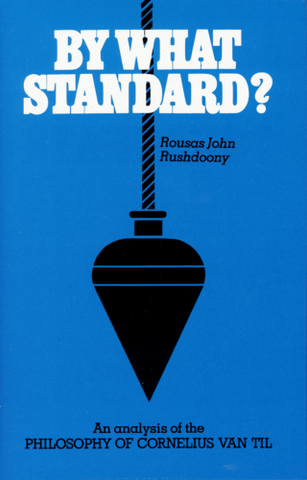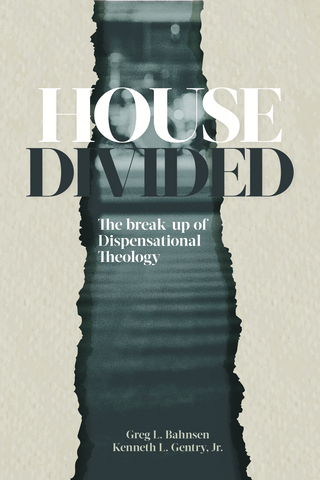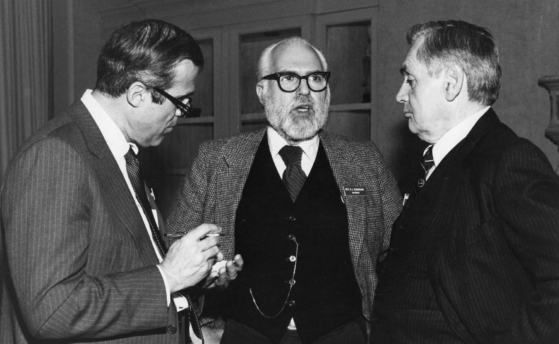In my three-part podcast (see here and here for the first and second) about the impact of Rousas Rushdoony (1916-2001), I mentioned, contrary to some, that his writings have had a significant impact on much of Christian thought today, directly and indirectly.
As a sort of hero of Christian education, Rushdoony’s basic ideas have directly or indirectly affected many conservative Protestants in North America (and probably beyond). Most probably do not know the name Rushdoony, but they might have heard arguments for homeschooling that have some connection to Rushdoony’s teaching on Christian education.[1]
I would go so far to say that much of conservative rhetoric is based on many of Rushdoony’s writings, and many who have borrowed from Rushdoony refuse to acknowledge him because, according to Gary North, he “is a theological hot potato.”[2] Mark Rushdoony wrote the following about his dad’s work:
My father has often been kept at arm’s length even by those who are sympathetic to his work. His concept of Christian Reconstruction was all-encompassing, and when added to his postmillennialism made for an antithesis so distinct that few have been willing to associate with more than a few of his positions. His reference to “all areas of life and thought” being brought subject to the Word of God meant just that, and the multiplicity of topics he touched on reflect the scope of his understanding of the needed work of the Kingdom. It is easy for most people to read at least something in his writing and say, “I’m not sure I want to go there.” This is, I believe, the very reason why many avoid using him—despite points of agreement, everyone can find something in Rushdoony they do not like. His full-orbed view of the faith was reflected in how he viewed his ministry, a pioneering work of exploring a distinctly Biblical approach for others to pursue. Many were leery of following him in such a bold and expansive Kingdom vision and so were standoffish or used him selectively; in many circles, the reaction was outright hostility.
What follows is some additional material to add to the podcasts related to Rushdoony’s influence.

By What Standard?
The sovereignty of the self-contained God is the key to every field, in that only the God of Scripture makes all things possible and explicable and is thus the basic premise not only of theology, but of philosophy, science and indeed all knowledge. In that God is the Creator of all things. He is their only valid principle of interpretation, in that they derive both their existence and meaning from His creative act. This belief is herein set forth in terms of various aspects of human thought.
Buy NowAt the 1980 National Affairs Briefing Conference that was held in Dallas where Ronald Reagan addressed around 15,000 attendees that included more than 2000 pastors, Gary North spoke with Robert Billings who had worked in Jerry Falwell’s Moral Majority Organization. They noted what a remarkable event it was. “We agreed that it was unfortunate that Rushdoony was not speaking. [Billings] said: ‘If it weren’t for his books, none of us would be here.’ I replied: ‘Nobody in the audience understands that.’ His response: ‘True, but we do.’”[3]
This is contrary to Mark David Hall’s claim that while Rushdoony “wrote in the 60s and 70s, he “had almost no influence” and “almost no one knows who he is.” It’s surprising that someone who has a PhD in government and does historical research somehow missed Rushdoony’s decades of work on the impact of secularism related American government, especially regarding government funding and control of education. “From the publication of Intellectual Schizophrenia in 1961 until the publication of The Institutes [of Biblical Law] in 1973, Rushdoony spent his time attacking humanism across the boards. He focused on education, but he always returned to politics.”[4] An example is his nearly 500-page book titled Sovereignty that critiques “the various places where man posits sovereignty—especially the sovereign state.” John Frame wrote the following in his 1976 review of Rushdoony’s Institutes of Biblical Law (1973):
Encouraging me to take on this review assignment, a colleague said, “We’ll have to start taking Rushdoony more seriously.” Though Rushdoony is one of the most prolific writers in the Reformed camp, though his following is large and increasing, and though his writings contain able exposition and scholarly defense of the Reformed faith, we have pretty much ignored him. His books have not been regularly reviewed and his name has not been frequently mentioned.
I have come to regard this, however, as a premature dismissal of an important Christian thinker. Recent experiences with Rushdoony associates and recent reading, particularly in The Institutes of Biblical Law, have convinced me that we must indeed take Rushdoony more seriously. In other fields I have had trouble at many points with Rushdoony’s argumentation; his Institutes, however, has convinced me that, whatever may be said in criticism of his work, Rushdoony is one of the most important Christian social critics alive today.
Even Hillary Clinton knew that Rushdoony was a “specialist in the history of American education.” It’s no wonder she knew who Rushdoony was because he served as an expert witness in 23 different homeschool cases that solidified the legality of homeschooling in the United States. It was Rushdoony’s testimony in the 1987 Texas Educ. Agency v. Leeper case that turned the tide for the legalization of homeschooling in the United States. Gary North notes, “The case went to the state’s supreme court. The school district lost. It cost the school district’s insurance company $360,000 to pay the defendants’ attorney fees and damages. That sent a message to all the other districts: ‘Leave these people alone.’” Defense attorney Shelby Sharpe had this to say about Rushdoony’s testimony:
His testimony was way beyond anything I’d hoped for. It was one of the few times in my career that I ever saw a witness destroy the attorney who was trying to examine him.
John Graham Child had this to say about Rushdoony’s influence in his Master of Theology thesis “Biblical Law in the Theology of R.J. Rushdoony: A Systematic Theological Analysis and Appreciation” (1985).
While it is not possible to accurately assess the influence of the Christian Reconstruction movement, some indication of its influence can be seen in the fact that Newsweek magazine, in analysing Reagan’s 1980 election victory, identified five major groups supporting Reagan…. Under the religious Right only one think-tank was named, [Rushdoony’s], Chalcedon.[5]
Leftists know their ideological enemies, but it’s sad that too many Christians don’t know who their ideological friends are.
Those on the Left know of Rushdoony and his impact. They’ve been writing about him for years. The most recent example is Michael J. McVicar’s Christian Reconstruction: R.J. Rushdoony and American Conservatismpublished by The University of North Carolina Press in 2015. Let’s not forget Julie J. Ingersoll’s Building God’s Kingdom: Inside the World of Christian Reconstruction (Oxford, 2015). Here are some others:
• Bruce Barron, Heaven on Earth?: The Social and Political Agendas of Dominion Theology (Zondervan, 1992).
• Sara Diamond, Roads to Dominion: Right-Wing Movements and Political Power in the United States(Guilford Press, 1995).
• Frederick Clarkson, Eternal Hostility: The Struggle Between Theocracy and Democracy (Common Courage Press, 1997).
• Max Blumenthal, Republican Gomorrah: Inside the Movement that Shattered the Party (Nation Books, 2009).
• Molly Worthen, Apostles of Reason: The Crisis of Authority in American Evangelicalism (Oxford University Press, 2014).
• Andrew Hartman, A War for the Soul of America: A History of the Culture Wars (University of Chicago Press, 2019).
• Kristin Kobes Du Mex, Jesus and John Wayne: How White Evangelicals Corrupted a Faith and Fractured a Nation (Liveright Publishing, 2020).
For someone who “had almost no influence,” a lot of ink and keystrokes have been spent on Rushdoony and Christian Reconstruction, including book-length critiques from Christian publishers Zondervan (Theonomy: A Reformed Critique by faculty members of Westminster Theological Seminary)[6] and Multnomah (Dominion Theology: Blessing or Curse? An Analysis of Christian Reconstruction, 1988). The Theonomy critique was responded to by Gary North in the books Westminster’s Confession: The Abandonment of Van Til’s Legacy and Theonomy: An Informed Response that included chapters from various writers including three from me. Greg Bahnsen and Kenneth Gentry responded to Dominion Theology with House Divided: The Break-Up of Dispensational Theology.
Then there are the numerous articles about Rushdoony and Gary North on Christian Reconstruction. Rodney Clapp’s “Democracy as Heresy,” published in Christianity Today (February 20, 1987) is a good example. There are many more from Christians and hardcore atheists.
Rushdoony’s work began in the 1950s and continued through the 1990s. Contrary to Hall, Rushdoony’s published newsletters, sermons, lectures, and books that continue to have an impact around the world. There’s hardly a Christian writer today who has matched Rushdoony’s publishing output. Check out Gary North’s article “R. J. Rushdoony: A Working Model of Productivity.”
Most of Rushdoony’s work was prescient because of his study of history, the consequences of failed presuppositions, and the failure to apply biblical law consistently.
If you want to see what government intervention has done to people, then pay close attention to the works of Rushdoony who served for eight and a half years as a missionary to the Shoshone and Paiute Indians on the Duck Valley Indian Reservation in a remote area of Nevada beginning in 1944. It was his time on the reservation where he deduced correctly that the State “is the giver of all things, the source of power, of land, and (having built a reservoir for irrigation here) even of water… The government hospital delivers the children, and the government army taketh them away, and blessed is the name of the government each Memorial Day and Fourth of July.” What our government did to American Indians is being done to all of us. Rushdoony saw it firsthand, and it was his work in biblical law and the apologetic methodology of Cornelius Van Til that he found the remedy. Let’s not forget Rushdoony’s work in eschatology. The pervasive pessimism of amillennialists and premillennialists (a defense-only strategy) rarely if ever offer any long-term solutions. The following from Mark David Hall gets this right about Rushdoony and eschatology:
Now, without getting too technical, let me just briefly mention that Rushdoony is a post-millennialist. He believes that the kingdom of God will advance on earth and more and more people will become saved, societies will become more Christian and so forth. So this is really kind of an eschatological vision. Most evangelicals, as you know, are pre-millennial dispensationalists. They think the world will get worse and worse. The rapture will occur, Christians will be taken up to heaven, there will be a literal seven-year tribulation and then Christ will return. If that’s your view of eschatology, it really doesn’t make sense to embrace theonomy. And a vast majority of evangelicals, including Pat Robertson and Jerry Falwell, are dispensationalists. So two of Jerry Falwell’s right-hand men [Thomas Ice and H. Wayne House] actually wrote a response back when Rushdoony was at his height [Dominion Theology: Blessing or Curse?],[7] saying, in effect, evangelicals will have no interest in this guy because he fundamentally has different theological beliefs than the vast majority of evangelicals.

House Divided: The Break Up of Dispensational Theology
House Divided is a postmillennial book. It does not seek to fight something (dispensationalism) with nothing (amillennialism). You are not being asked to abandon hope in dispensationalism's escape hatch in the future (the pre-tribulation Rapture) only to take up residence in amillennialism's Fort Contraction, with a tribe of howling Darwinian Indians circling it, all armed with repeating rifles. You are being asked instead to join a victorious army led by Jesus Christ, who sits at God's right hand, and who will remain seated there until He subdues all His enemies under His feet. ''Then cometh the end, when he shall have delivered up the kingdom to God, even the Father; when he shall have put down all rule and all authority and power. For he must reign, till he hath put all enemies under his feet" (1 Cor. 15:24-25).
Buy NowThe government’s “management” of Native Americans ruined their lives. Rushdoony told about the impact of this process in a prescient article published in 1954 in the book Essays on Liberty, a publication of the Foundation for Economic Education (FEE). As you read it below, note how Rushdoony’s reservation experience has broadened in scope to include most Americans who are now on a much larger national reservation. If you want to get addition insights from Rushdoony on the American Indians, I suggest you get his book The American Indian: A Standing Indictment Against Christianity and Statism in America and read Gary North’s brief review of it here. What follows is Rushdoony’s article “Wards of the Government.”
________________________________
The reservation Indian is becoming less self-sufficient and more dependent upon what he calls “the Great White Father in Washington.” Instead of freedom, the Indian has government-guaranteed “security.” Instead of individual responsibility, he has a government bureau to handle his personal affairs. There are special laws governing his right to own land and to spend tribal money. Under that system of bondage, it would surprise no one to find that many thousands of Indians have remained uneducated, hungry, diseased, and mismanaged. —FROM [Dean Russell] Wards of the Government**[8]**
As a missionary to the Indians, [Rushdoony writes] I find your warnings underscored by my daily experience. One of the surest consequences of a government of “welfare” and “security” is the rapid decline and death of responsibility and character.
Whatever the pre-reservation Indian was—and his faults were real—he was able to take care of himself and had a character becoming to his culture and religion. He was a responsible person. Today he is far from that. The wretched security he has had, beginning with the food and clothing dole of early years, designed to enforce the reservation system and destroy Indian resistance, has sapped him of character. The average Indian knows that he can gamble and drink away his earnings and still be sure that his house and land will remain his own; and, with his hunting rights, he can always eke out some kind of resistance.
Government men too often hamper and impede the man with initiative and character. This is because their program inevitably must be formulated in terms of the lowest common denominator, the weakest Indian. In addition, the provisions of the government for the “welfare” and “security” of the Indians remove the consequences from their sinning and irresponsibility. The result is a license to irresponsibility, which all the touted government projects cannot counteract.
And I believe the results would be no better for the best hundred or thousand persons selected from any society, after a generation or so of the same kind of “welfare” and “security” government.
There are many men in the Indian Service who are sincerely and earnestly trying to improve the Indian’s welfare. They are, however, faced with this constant dilemma: All their zealous and patient efforts to help the Indian simply tend to become another crutch that the Indian depends on. Those Indians who have become progressive and independent apparently have done so because of personal and religious factors totally unrelated to the government program.
[1] Wyatt Graham, “R. J. Rushdoony: A Patriarch for Modern Theonomy” (February 17, 2022): https://ca.thegospelcoalition.org/columns/detrinitate/r-j-rushdoony-a-patriarch-for-modern-theonomy/
[2] Gary North and David Chilton, “Apologetics and Strategy,” Christianity and Civilization (3): Tactics of Christian Resistance (Tyler, TX: Geneva Divinity School Press, 1983), 124.
[3] Gary North, “The Intellectual Schizophrenia of the New Christian Right,” Christianity and Civilization: The Failure of the American Baptist Culture” (1982), 12.
[4] Gary North, “McVicar on Rushdoony: A Review Article” Remnant Review, vol. 47 (October 10, 2020): https://www.garynorth.com/public/21423.cfm
[5] David M. Alpern, “The Right: A House Divided?” Newsweek (February 1981), 38-40.
[6] “Given the fact that the Westminster faculty had previously produced only three symposia from the school’s inception in 1929, beginning with The Infallible Word in 1946, why did they decide to write this one? I still find it revealing that not one of the other three symposia was devoted to a refutation of a particular theological movement. The faculty must be publicly scratching where the itching is most intense. But why is their itching so intense? Lurking here is the making of a doctoral dissertation in the sociology of knowledge.” Gary North, “McVicar on Rushdoony: A Review Article.”
[7] Responded to by Greg Bahnsen and Kenneth Gentry in House Divided: The Break-Up of Dispensational Theology.
[8] Here’s the link to a speech by Dean Russell on “Wards of the Government” delivered in 1950: https://www.fff.org/explore-freedom/article/wards-government/

